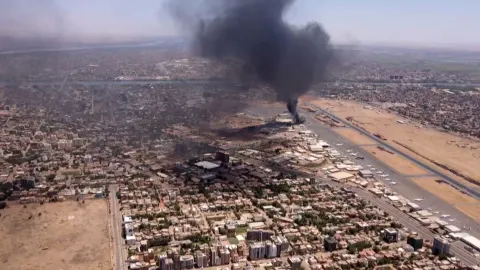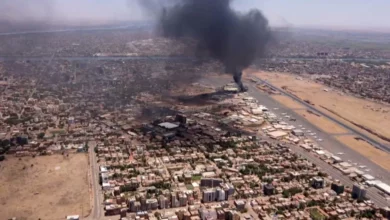
One of Sudan’s two warring factions has declared a 72-hour truce after nearly a week of fierce fighting, which has left more than 330 people dead and pushed tens of thousands of refugees to flee the country.
Despite the announcement from the paramilitary Rapid Support Forces (RSF), clashes continued Friday north of the capital – and there has been no confirmation of a ceasefire by its rival Sudan Armed Forces (SAF).
The paramilitary RSF announced the ceasefire in a statement on Twitter early Friday morning local time, saying it was due to begin at 6 a.m.
The ceasefire comes just ahead of the Muslim holiday of Eid al-Fitr, which marks the end of the Islamic holy month of Ramadan.
“The truce coincides with the blessed Eid al-Fitr … to open humanitarian corridors to evacuate citizens and give them the opportunity to greet their families,” the RSF said.
SAF leader Abdel Fattah al-Burhan released an on-camera statement Friday morning, expressing sadness for victims of the fighting and praying for a peaceful Eid – but he made no mention of a truce.
“The ruin and destruction and the sound of gunfire have not allowed a space for the joy that our people across our beloved country deserve, and we are deeply saddened by this,” Burhan said in the statement – his first on-camera remarks since clashes broke out on April 15.
Eyewitnesses that CNN has spoken with said fierce fighting was still raging in Khartoum North, an area north of the capital, on Friday.
World leaders and international organizations have been urging the RSF and SAF to strike a deal since clashes began, but several temporary ceasefires have repeatedly broken down, with both sides trading blame for violating the terms.
US Secretary of State Antony Blinken spoke to the heads of both factions earlier this week, and again on Thursday to urge a ceasefire through at least the end of the Eid weekend.
UN Secretary General António Guterres also called for a ceasefire on Thursday “for at least three days marking the Eid al Fitr celebrations to allow civilians trapped in conflict zones to escape and to seek medical treatment, food and other essential supplies.”
Hours before the RSF’s announcement, the African Union called for a one-week ceasefire to allow for the observation of Eid.
The pleas for a truce have grown more urgent in recent days as the death toll climbs. Most hospitals in the capital Khartoum are out of operation, with many having come under attack by shelling; meanwhile, those still operating are rapidly running out of supplies to treat survivors.
Residents have been stranded at home and in shelters without food or water, surrounded by the threat of gunfire and artillery outside.
The fighting could force millions into hunger, the World Food Program (WFP) warned on Thursday.
“Record numbers of people were already facing hunger in Sudan before the conflict erupted on April 15,” it said in a statement, adding that the fighting was preventing the organization from delivering emergency food to civilians.
Evacuation efforts
The ceasefire could provide a crucial window not just for aid distribution and medical care – but for foreign governments to reach their citizens stranded in Sudan.
The US Defense Department said on Thursday it was deploying “additional capabilities” nearby Sudan to secure the US Embassy in the country and assist with a potential evacuation, if the situation calls for it. It includes hundreds of Marines who are already in nearby Djibouti, a US defense official told CNN, with aircraft capable of bringing in ground units to secure an embassy.
US President Joe Biden had “authorized the military to move forward with pre-positioning forces and to develop options in case – and I want to stress right now – in case there’s a need for an evacuation,” National Security Council spokesman John Kirby said Thursday.
Officials told staffers Wednesday that there are an estimated 16,000 American citizens in Sudan, most of whom are dual nationals. Roughly 500 had contacted the US Embassy since the outbreak of fighting, though only around 50 of those people had asked for help, according to the staffers.
Some countries have already begun the evacuation process, with Japan announcing it would send its Self-Defense Forces to evacuate 60 Japanese nationals, including embassy staff, from Sudan.
South Korea’s defense ministry said Friday it would send a military transport plane to evacuate its nationals from Sudan, adding that the aircraft and troops will “watch the situation from the US military base in Djibouti” since the Khartoum international airport remains closed. It added that all 26 South Koreans in Sudan have been confirmed to be safe, and that their forces would “prioritize the evacuation.”
Sudan’s army said Thursday that 177 Egyptian soldiers who had been trapped in the country were evacuated and safely returned to Egypt.
Local residents, too, are fleeing the country in huge numbers. Eyewitnesses in Khartoum describe growing lines of people at bus stops, hoping to escape the fighting. And up to 20,000 refugees from Sudan’s Darfur region have fled to neighboring Chad in recent days, according to a statement from the UN Refugee Agency.




